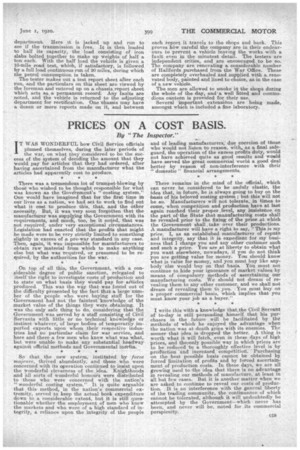PRICES ON A COST BASIS.
Page 11

If you've noticed an error in this article please click here to report it so we can fix it.
By "The Inspector."
IT WAS WONDERFUL how Civil Service officials plumed themselves, during the later periods of the war, on what they considered to be the success of the system of deciding the amount that they would pay for articles that they had ordered, after having ascertained from the manufacturer what the .articles had apparently cost to produce.
There was a tremendous lot of trumpet-blowing by those who wished to be thought responsible for what was known as the Government's "costing system." One would have imagined that for the first time in our lives as a nation' we had set to work to find out what it cost to produce this, that, and the Other necessity. But, it was very soon forgotten that the manufacturer was supplying the Government with its requirements, and much, too, be it noted, that was not required, under very exceptional circumstances". Legislation had enacted that the profits that might be made were to be very strictly limited to something slightly in excess of a pre-war standard in any case. Then, again, it was impossible for manufacturers to obtain raw material from which to make anything else but what was -required, •or presumed to be required, by the authorities for the war.
On top of all this, the Government, with a considerabk degree of public sanetion, relegated to itself the right to investigate coats of production and -to state on what basis they Would pay foraiticles produced. This was the way that was found out of the difficulty presented by the fact that a large number of the people who were buying stuff for the 'Government had not the faintest knowledge of the market value of the things they were_ obtaining. It was the only safe thing to do, considering that the Government was served by a staff consisting of Civil Servants with little or no technical knowledge or instinct whatever, of large bodies of temporarily imported experts upon whorn their respective industries bad no particular claim for war service, and here and there a few men who knew what was what,. but were unable to make any substantial headway against official methods and Governmental inertia.
So that the new system, instituted by force grtajeure, thrived abundantly, and those who were concerned -with its operation continued to insist upon the, wonderful cleverness of the idea. Knighthoods and all sorts of wonderful honoieS were distributed to those who were concerned with the nation's "wonderful costing system." It is quite arguable thatthis method, in the nation's commercial extremity, served to keep the actual book expenditure down to a considerable extent, but it is still questionable whether the employment of men who knew the markets and who were of a high standard of integrity, a reliance upon the integrity of the people and of leading manufacturers, due coercion of those who would not listen to reason, with, as a final safeguard, the operation of the excess profits duty, would not have achieved quite as good results and would have served the great commercial world a good deal better by reason of non-interference with their " domestic " financial arrangements.
There remains in the mind of the official, which can never be considered to be unduly elastic, the idea that, in future, he is always going to buy on the basis of his beloved costing system ; but this will not be so. Manufacturers will not tolerate, in times to come, when competition and production have at last again reached their 'proper ,level, any insistence on the part of the State that manufacturing costs shall be revealed prior to the fixing of the price at which the Government shall .take over their productions. A manufacturer will have a right to say, This is my price, I, as an established manufacturer of repute and integrity, say that it is expedient for my business that I charge you and any other customer su.ch and such a price. You are at liberty to obtain what you want elsewhere, nowadays, if you do not think you are getting value for money. You should know what is value for money, and you must buy like anybody elee would buy on that basis. You must not continue to _hide your ignorance of market values by means of compulsory methods of ascertaining our manufacturing costs. We should not dream of revealing them to any other customer, and we shall not dream of revealing them to. you. You must buy on a proper commercial basis, which implies that you must know your job as a, buyer.".
I write this with a knowledge that,the Civil Servant of to-day is still persuading himself, that his purchases in the future will be facilitated by the methods of which he enjoyed the advantage when the nation was at death grips with its enemies. The sooner that idea is dropped the better. A thing is worth what it will fetch, even in these days of high prices, and thelonly possible way in which prices are to be reduced to a thoroughly effective level is by proThiction and iacreased conapetition. " Purchasing on the best possible basis cannot be obtained by_ forced limitation of profits and by forced ascertainment of production costs. In these' days, we are all growing used to .the idea that there is no advantage in revealing our methods of manufacture, at least in all but few cases. But it is anbther matter, when we are asked to continue to reveal our costs of production. It is an interference with the general liberty of the trading community, the continuance of which cannot be tolerated, although it will undoubtedly be. attempted by the Government—which never has been, and never will be, noted for its commercial perspicuity.




























